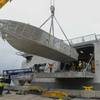Australia, Japan to Pursue Closer Military Tech Ties
Australia and Japan will create a framework pact to cooperate on military technology, the two countries said on Wednesday, a move that could pave the way for Japan to supply stealth submarine designs and components to Australia.
The agreement came during talks between Australian Defence Minister David Johnston and Australian Foreign Minister Julie Bishop and their Japanese counterparts, Itsunori Onodera and Fumio Kishida, in Tokyo.
"Ministers confirmed the substantial conclusion of negotiations on an agreement for cooperation in the field of defence equipment and technology," the countries said in a joint statement.
"We see ourselves as natural partners in many ways," Australia's Bishop told reporters after the meetings.
In an interview earlier on Wednesday, Johnston told Reuters Australia wanted to bolster ties with Japan in military technology that could range from a possible submarine deal to cooperation in maintaining F-35 jet fighters that both counties are buying from Lockheed Martin Corp.
"We are looking to push the relationship a little further along, carefully and discreetly, as to how we might better inter-operate."
The dismantling of an arms export ban by Japan in April has opened the way for the country to pursue a ground-breaking deal that would help Australia build a fleet of stealth submarines to extend its surveillance reach deep into the Indian Ocean.
Onodera said a schedule had yet to be fixed for further talks on defense technology.
Although any submarine deal is far from certain - Australia is also looking at possible designs from Germany, France and Sweden - and could hinge on a new security deal that could anger China, there is a growing will among officials in Tokyo and Canberra to forge a framework for one, sources familiar with the talks told Reuters last month.
A deal could include hull design, going beyond discussions last year that were limited to engine technology, the sources in Tokyo said.
Australia's proposed fleet of diesel submarines is at the core of the nation's maritime defence strategy.
"We must retain a submarine capability in Australia as one of our most significant strategic deterrents," Johnston told Reuters.
His government, he said, would decide next year in a new defence white paper how many submarines it will build, possibly fewer than the 12 proposed in 2009.
Johnston described an estimate of A$40 billion dollars for that programme as "far too high" for Australian taxpayers to accept, although he declined to predict how much the new fleet of submarines would cost.
Any pact on closer industrial ties could also see Japan and Australia cooperate in military hardware beyond submarines, Johnston said earlier.
The talks also led Japan and Australia to "compare notes" on Lockheed Martin's F-35 fighter that both nations plan to deploy, Johnston said, helping them sustain a programme that sits at the heart of their air defence strategies in the next few decades.
"We are both fundamentally purchasers of U.S., predominantly, and some European platforms, and we share sustainment issues and technical issues around how we evolve those platforms to our own needs," Johnston added.
Reporting by Tim Kelly










